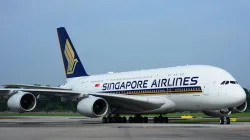Singapore Airlines flight with 249 passengers on board makes emergency landing in Taiwan due to THIS reason
The Singapore Airlines flight landed "uneventfully" at the airport, the report quoted a Singapore Airlines spokesperson as saying.

Singapore: A Singapore Airlines (SIA) flight bound for Tokyo was diverted to Taipei in Taiwan on Monday due to a "cracked windshield", according to the flag carrier. Flight SQ636, carrying 249 passengers and 17 crew members, took off from the city-state's Changi Airport at 11.07 pm on Sunday and was due to touch down at Japan's Haneda Airport at 6.20 am on Monday.
The Boeing 777-300ER aircraft had to divert to the Taoyuan International Airport in Taipei because of a cracked windshield that occurred mid-flight, Channel News Asia reported. The flight landed "uneventfully" at the airport, the report quoted a Singapore Airlines spokesperson as saying.
It has since been renumbered and will depart Taipei for Tokyo at 8.30 pm. It is due to arrive at Haneda Airport at 12.30 am on Tuesday, a delay of about 18 hours. "SIA sincerely apologises to all affected customers for the inconvenience caused," said the spokesperson, adding that the safety of its customers and crew is its top priority.
The airlines arranged hotel accommodations for the affected customers, according to the report.
Singapore Airlines horror
Earlier in May this year, a Singapore Airlines flight hit by severe turbulence last week showed that a rapid change in gravitational force and a 54-metre altitude drop caused injuries. A 73-year-old passenger died of a suspected heart attack and dozens were injured after flight SQ321, flying from London to Singapore, encountered what the airline described as sudden, extreme turbulence while flying over Myanmar.
The May 21 flight on a Boeing plane carrying 211 passengers and 18 crew diverted to Bangkok for an emergency landing after the plane was buffeted by turbulence that flung passengers and crew around the cabin, slamming some into the ceiling. "The aircraft experienced a rapid change in G (gravitational force) ... This likely resulted in the occupants who were not belted up to become airborne," the Singapore Transport Ministry said in a statement.
"The vertical acceleration changed from negative 1.5G to positive 1.5G within 4 seconds. This likely resulted in the occupants who were airborne to fall back down," it said, citing information extracted from the flight data and cockpit voice recorders.
"The rapid changes in G over the 4.6 seconds duration resulted in an altitude drop of 178 ft (54 m), from 37,362 ft to 37,184 ft. This sequence of events likely caused the injuries to the crew and passengers," it added.
(With inputs from agency)